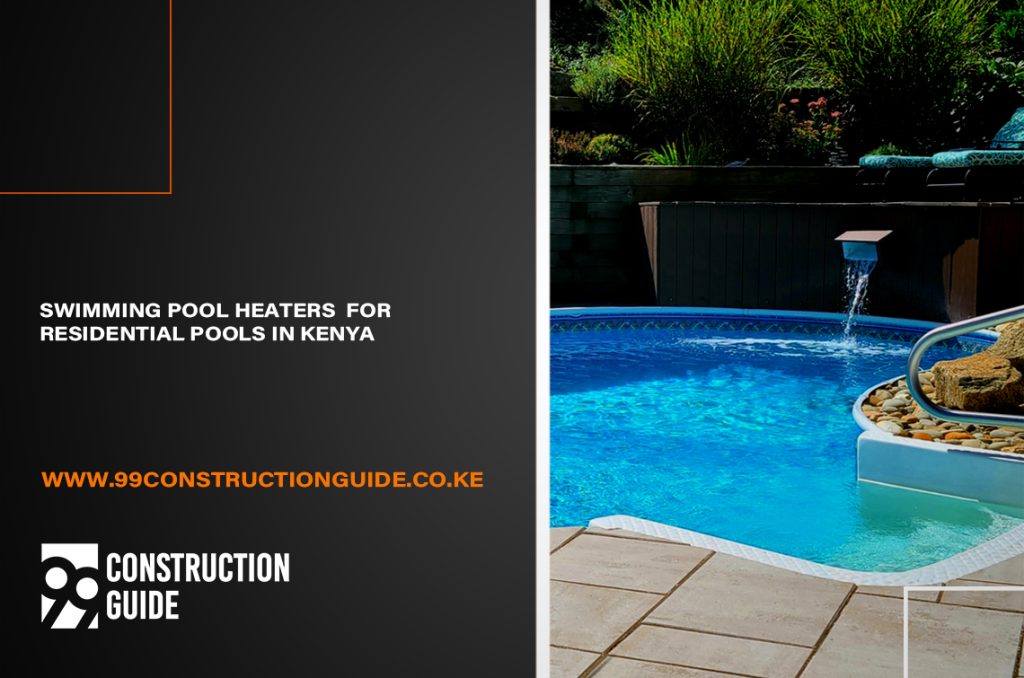Swimming pools are artificial pools constructed for exercise and recreational purposes. they may be indoor or outdoor as well. Pools are filled with water with the help of pumps, the water might be circulating or stagnant. chlorine and other antiseptic agents are added to kill germs. The water in the pool is circulated for filtration and renewal of water purposes. While adding a swimming pool construction in Kenya in your backyard might be an expensive investment, it can also add resale value. There are a variety of materials used to construct swimming pools and different types of swimming pools, each with its specific pros and cons.

Materials used in swimming pool construction in Kenya
-
Concrete swimming pools
To provide strength to the walls and floors of the pool reinforced concrete is used to construct the swimming pool. This gives concrete pools unlimited chances of design and location since they can be placed in any desired location. The finishing options include ceramic tiles, natural pebble, quartz, epoxy paints, and vinyl lining.
Pros
Very long life expectancy, very flexible in shape, size, and depth.
Cons
Must be strong enough to withstand round movements, may take time to complete, expensive to construct must be adequately designed and constructed to avoid cracks and leaks
-
Fiberglass swimming pools
These types of swimming pools have a factory-made complete fiberglass liner which is then transported to the site where there is a dug hole in the ground. they are however limited in size.in addition to minimal long-term maintenance, the surface of fiberglass is impermeable and resistant to algae growth
Pros
Quick and easy to install, lower cost than concrete pools, smooth inner finish makes them safer than concrete pools
Cons
Limited to size, need cranes to lift them into place, need to be correctly installed. have the tendency to pop out of the pool when left empty.
-
Vinyl swimming pools
This is a popular and cost-effective type of material for swimming pool construction. The custom-made plastic lining stretches across the walls of the pool giving you a wide range of shapes and sizes to meet your vision.
Pros; Lowest upfront costs, smooth and non-porous
Cons; They can be easily punctured causing pool failure with costly repairs, and require frequent liner replacement.

Important things to consider when designing and constructing a swimming pool in Kenya.
It is essential that swimming pools are designed and constructed properly by professionals with the appropriate skills to avoid damage and swimming pool failures. Let’s have a look at factors to consider when constructing a residential swimming pool in kenya.
-
Size and shape of the swimming pool
You need to consider the purpose of the people using it and who will be using it to determine the size and shape of the pool. for aesthetics you may consider a curved or kidney-shaped one, however, if it is used for laps then it needs to be long and straight.
-
The depth and volume of water in the swimming pool
A larger and deeper pool will cost more to maintain than a smaller pool., especially in electricity costs for pumping.
-
Safety of the pool
The safety of the swimming pool is crucial in terms of how to get in and out. consider building steps that should be shallow enough. Stainless steel ladders are also very efficient.
-
Swimming pool lining
Consider the type of lining you want to use. For concrete pools ceramic tiles are more expensive but provide low maintenance long lasting finish.
-
The strength of the swimming pool shell
The bottom and walls of the pool must be strong and rigid enough to hold the water without flexing and cracking. The reinforcing steel must be correctly designed and have sufficient coverage.

Wrap up
Besides just fitting your budget and style making a decision on the best material to use for your swimming pool construction in Kenya requires planning ahead in terms of maintenance, expectation, and vision. each of the discussed pool materials serves its purpose perfectly fine. it is therefore up to you to choose the best swimming pool type.


